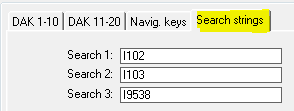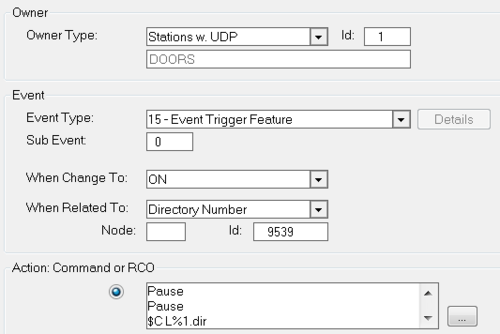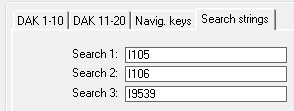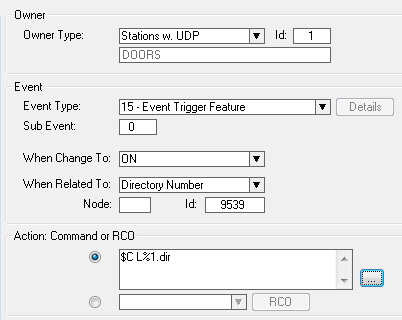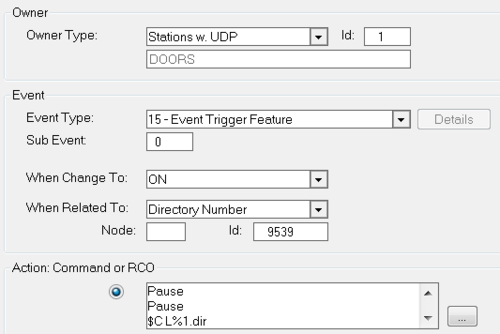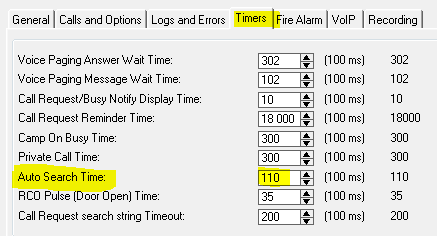Automatic Search with more than 3 hops: Difference between revisions
From Zenitel Wiki
(Created page with "This article describes one method the extend the automatic search range. In the example below the doors (UDP group 1) are all ringing to station 101, which unanswered will t...") |
No edit summary |
||
| (7 intermediate revisions by 2 users not shown) | |||
| Line 1: | Line 1: | ||
This article describes one method the extend the [[automatic search]] range. | {{AI}} | ||
This article describes one method the extend the [[Search#Automatic_search|automatic search]] range. | |||
In the example below the doors (UDP group 1) are all ringing to station 101, which unanswered will transfer to 102, 103, 104, 105 and 106 in a sequence. | In the example below the doors (UDP group 1) are all ringing to station 101, which unanswered will transfer to 102, 103, 104, 105 and 106 in a sequence. | ||
''Step 1'' | '''''Step 1''''' | ||
Create two [[event trigger]] numbers in [[Directory&Features]]: | Create two [[Event_Trigger_(Event_Type)|event trigger]] numbers in [[Directory_%26_Features_(AlphaPro)|Directory&Features]]: | ||
[[File:AutoSearch app1.PNG|thumb|500px|left]] | [[File:AutoSearch app1.PNG|thumb|500px|left]] | ||
<br style="clear:both;" /> | |||
[[File:AutoSearch app2.PNG|thumb|500px|left]] | [[File:AutoSearch app2.PNG|thumb|500px|left]] | ||
<br style="clear:both;" /> | |||
''Step 2'' | '''''Step 2''''' | ||
Set up Automatic Search for 101 - Front Desk: | Set up Automatic Search for 101 - Front Desk: | ||
[[File:AutoSearch app3.PNG|thumb|500px|left]] | [[File:AutoSearch app3.PNG|thumb|500px|left]] | ||
<br style="clear:both;" /> | |||
The Automatic Search will transfer the call to 102, then 103 and finally it will force the door station to dial an event trigger: | The [[Users_%26_Stations_(AlphaPro)#DAK|Automatic Search]] will transfer the call to 102, then 103 and finally it will force the door station to dial an event trigger: | ||
[[File:AutoSearch app4.PNG|thumb|500px|left]] | [[File:AutoSearch app4.PNG|thumb|500px|left]] | ||
<br style="clear:both;" /> | |||
''Step 3'' | '''''Step 3''''' | ||
Create the Event: | Create the [[Event_Handler|Event]]: | ||
[[File: | [[File:AutoSearch_app10.PNG|thumb|500px|left]] | ||
<br style="clear:both;" /> | |||
{{Code2| | |||
Pause | |||
Pause | |||
$C L%1.dir | |||
Pause | |||
Pause | |||
$CALL L%1.dir L104 | |||
}} | |||
Now the door is actually calling 104, which has its own search list: | Now the door is actually calling 104, which has its own search list: | ||
[[File:AutoSearch app6.PNG|thumb|500px|left]] | [[File:AutoSearch app6.PNG|thumb|500px|left]] | ||
<br style="clear:both;" /> | |||
[[File:AutoSearch app7.PNG|thumb|500px|left]] | [[File:AutoSearch app7.PNG|thumb|500px|left]] | ||
<br style="clear:both;" /> | |||
The second search set will transfer the call to 105, then 106 and finally it will force the door station to call yet another event trigger. This time it is possible to choose to either end the call, or make a loop back to the first station: | The second search set will transfer the call to 105, then 106 and finally it will force the door station to call yet another event trigger. This time it is possible to choose to either end the call, or make a loop back to the first station: | ||
''Step 4a'' | '''''Step 4a''''' | ||
Ending the call: | Ending the call: | ||
[[File:AutoSearch app8a.PNG|thumb|500px|left]] | [[File:AutoSearch app8a.PNG|thumb|500px|left]] | ||
<br style="clear:both;" /> | |||
{{Code2| | |||
$C L%1.dir | |||
}} | |||
''Step 4b'' | '''''Step 4b''''' | ||
Making a loop: | Making a loop: | ||
[[File:AutoSearch | [[File:AutoSearch_app11.PNG|thumb|500px|left]] | ||
<br style="clear:both;" /> | |||
{{Code2| | |||
Pause | |||
Pause | |||
$C L%1.dir | |||
Pause | |||
Pause | |||
$CALL L%1.dir L101 | |||
}} | |||
'''''Step 5''''' | |||
The above described solution will require that all receiving stations are set to [[Open_/_Private_selection_feature|private]]. The private ring time can be changed in the global settings under [[Exchange_%26_System_(AlphaPro)#Timers|Exchange&System->System->Timers]]. Default is 11 seconds: | |||
[[File:AutoSearch app9.PNG|thumb|500px|left]] | |||
<br style="clear:both;" /> | |||
[[Category:AlphaCom Applications]] | |||
[[Category:ICX-AlphaCom Applications]] | |||
Latest revision as of 12:56, 31 May 2022
This article describes one method the extend the automatic search range.
In the example below the doors (UDP group 1) are all ringing to station 101, which unanswered will transfer to 102, 103, 104, 105 and 106 in a sequence.
Step 1
Create two event trigger numbers in Directory&Features:
Step 2
Set up Automatic Search for 101 - Front Desk:
The Automatic Search will transfer the call to 102, then 103 and finally it will force the door station to dial an event trigger:
Step 3
Create the Event:
Action commands:
Pause Pause $C L%1.dir Pause Pause $CALL L%1.dir L104
Now the door is actually calling 104, which has its own search list:
The second search set will transfer the call to 105, then 106 and finally it will force the door station to call yet another event trigger. This time it is possible to choose to either end the call, or make a loop back to the first station:
Step 4a
Ending the call:
Action commands:
$C L%1.dir
Step 4b
Making a loop:
Action commands:
Pause Pause $C L%1.dir Pause Pause $CALL L%1.dir L101
Step 5
The above described solution will require that all receiving stations are set to private. The private ring time can be changed in the global settings under Exchange&System->System->Timers. Default is 11 seconds:





